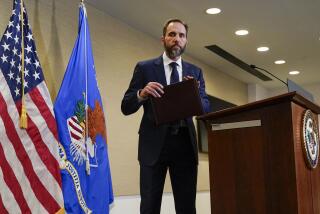Trump indicted on 37 charges including Espionage Act violations in classified records case
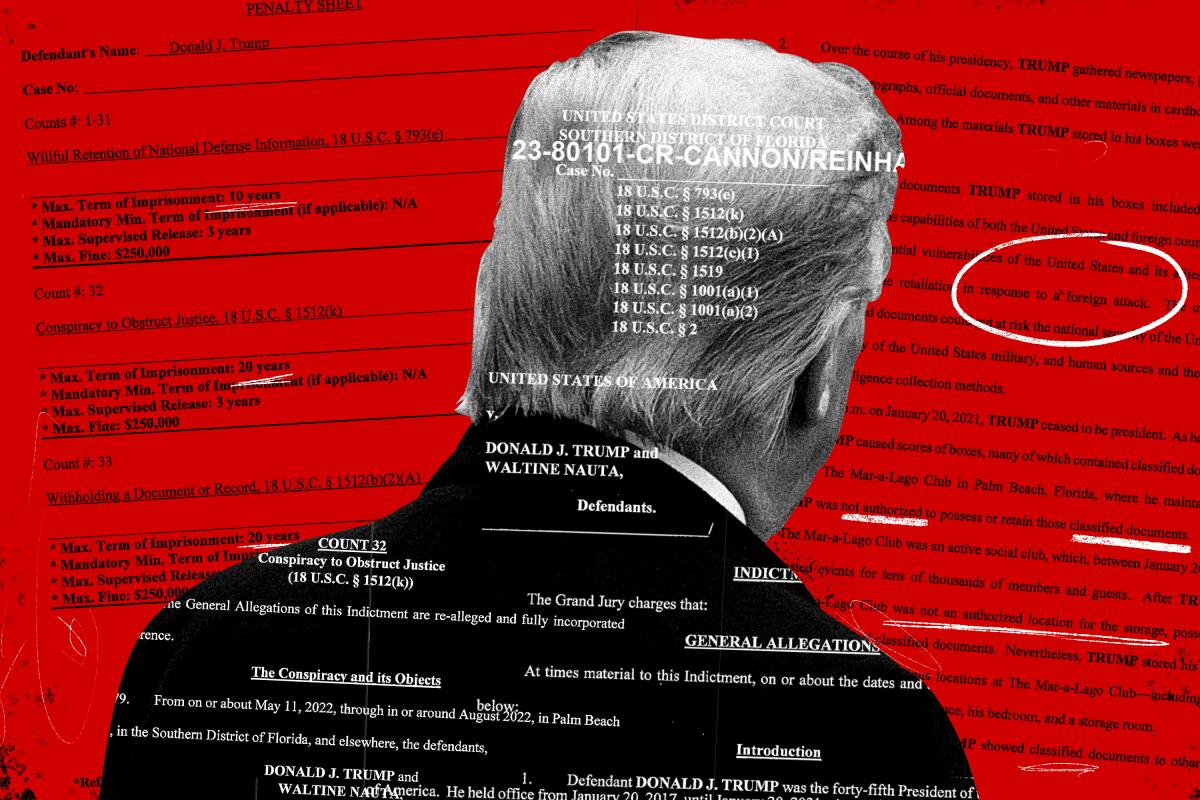
- Share via
WASHINGTON — Former President Trump was indicted on 37 charges, including 31 counts of violations of the Espionage Act, as part of special counsel Jack Smith’s investigation into Trump’s handling of classified documents from his time in the White House.
The 49-page indictment, released Friday by the Department of Justice, details accusations that Trump stored boxes containing classified documents in various locations at Mar-a-Lago, his Florida estate, including a ballroom, a bathroom and shower, his office, his bedroom and a storage room.
According to the indictment, among the top-secret and other classified records were details on foreign nations’ nuclear capabilities, as well as information regarding defense and weapons capabilities of both U.S. and foreign countries, U.S. nuclear programs, potential vulnerabilities of the U.S. and its allies to military attack, and plans for possible retaliation in response to an attack.
Read the indictment: United States of America vs. Donald J. Trump and Waltine Nauta
Key allegations against Trump
• That he retained documents detailing U.S. vulnerabilities to attack and the military capabilities of the U.S. and other countries;
• That he stored them in boxes that weren’t behind locked doors, including on the stage of a ballroom and in a bathroom;
• That twice in 2021, he showed a classified document to individuals without security clearances;
• That he questioned whether he needed to comply with an FBI subpoena, asking his lawyer: “Wouldn’t it be better if we just told them we don’t have anything here?”
• That at his order, only some of the boxes of documents were made available when his lawyer searched for classified records to comply with the subpoena.
The indictment includes several photos of the boxes in different locations around Mar-a-Lago, including on a ballroom stage, where they stayed for two months while the ballroom continued to be used for events, and a bathroom and shower. One of the photos shows a stack of boxes that had fallen over in a storage room. Visible in the photo are documents marked with a designation that the information can only be released to the closest allies of the U.S.: Australia, Canada, New Zealand and the United Kingdom.
Trump is charged with willful retention of national defense information; conspiracy to obstruct justice; withholding a document or record; corruptly concealing a document in a federal investigation; scheming to conceal; and false statements and representations.
In a brief televised statement, Smith urged the public to read the indictment in order to understand “the gravity of the crimes charged.” He also said he was aiming for a speedy trial.
“The men and women of the United States intelligence community and our armed forces dedicate their lives to protecting our nation and its people. Our laws that protect national defense information are critical to the safety and security of the United States and they must be enforced,” Smith said. “We have one set of laws in this country and they apply to everyone.”
The indictment details accusations that in two instances in 2021, Trump shared classified information with people who lacked security clearances. The indictment also confirms a CNN report on the existence of a recording in which Trump indicates understanding that he cannot declassify records after leaving office and acknowledges that he possesses a classified record.
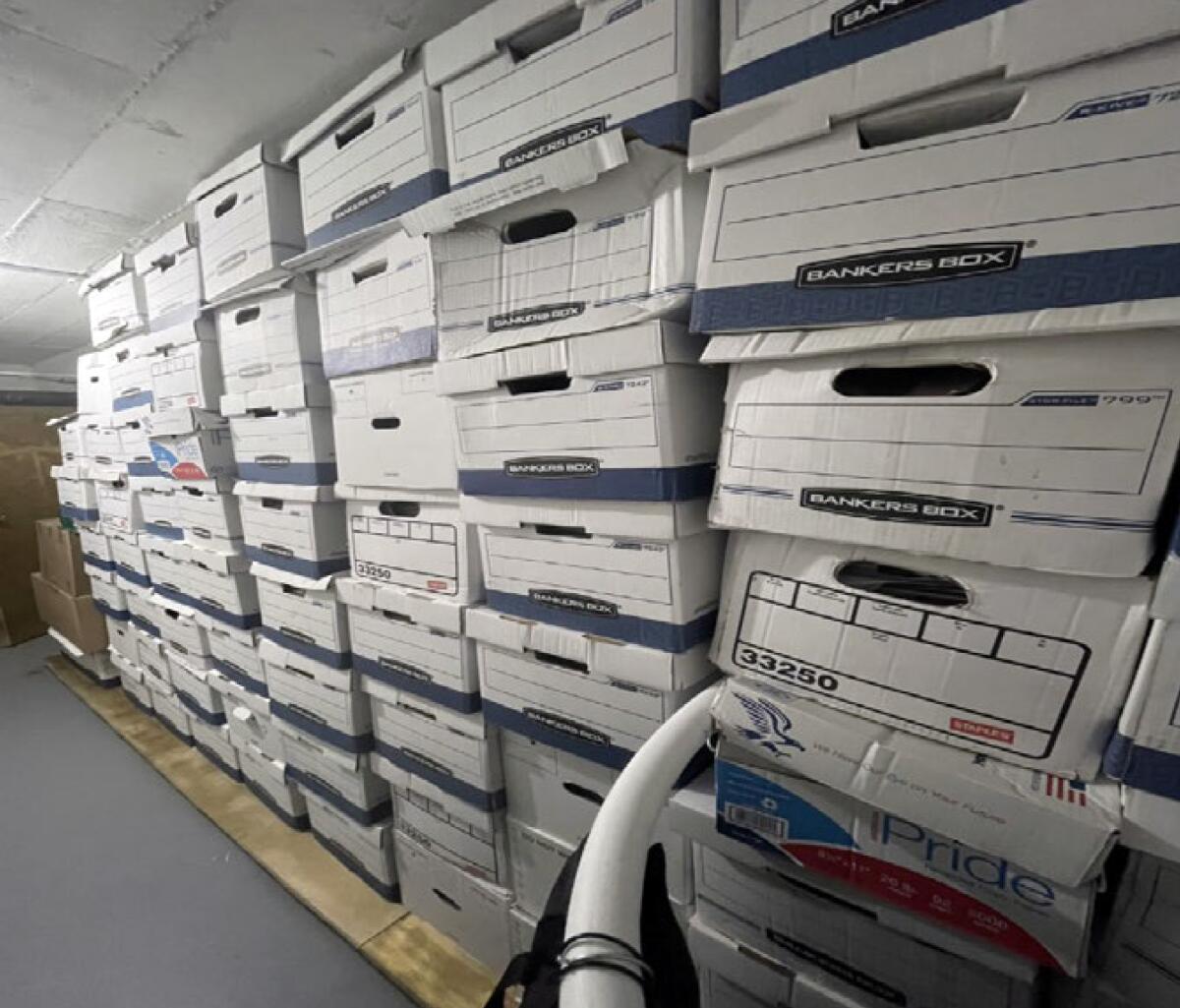
The investigation began after the National Archives found classified records in a batch of documents Trump returned in 2022, a year after leaving office. Justice Department officials then sought a subpoena demanding that he return any other classified material in his possession.
The indictment cites notes from a May 23, 2022, conversation between Trump and his lawyer Evan Corcoran in which the former president questioned whether he had to fully comply with the subpoena, including making the statements, “I don’t want anybody looking through my boxes. I don’t want you looking through my boxes,” “Wouldn’t it be better if we just told them we don’t have anything here?” and, “Well look, isn’t it better if there are no documents?”
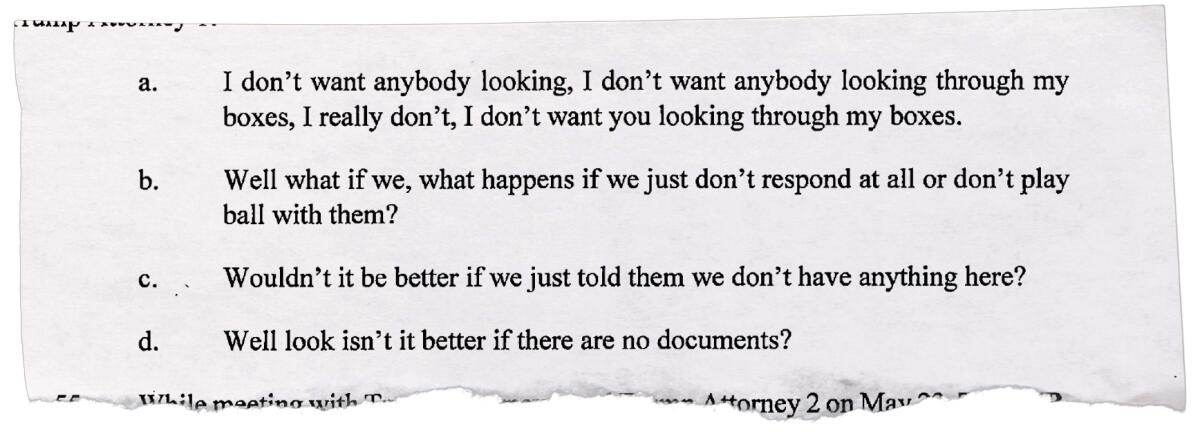
Trump’s legal team ultimately produced about three dozen additional documents and a letter stating that a diligent search had turned up nothing more. But the indictment says Trump’s lawyers didn’t have access to all of the records for their search.
The indictment states that between May 23 and June 2 of last year — during the window after the subpoena was issued but before Corcoran could review the documents — Trump had his personal aide Waltine “Walt” Nauta move 64 boxes out of the Mar-a-Lago storage room to Trump’s residence so the former president could go through the contents, and that Nauta later returned only 30 boxes to the storage room. This was hidden from Corcoran, according to the indictment.
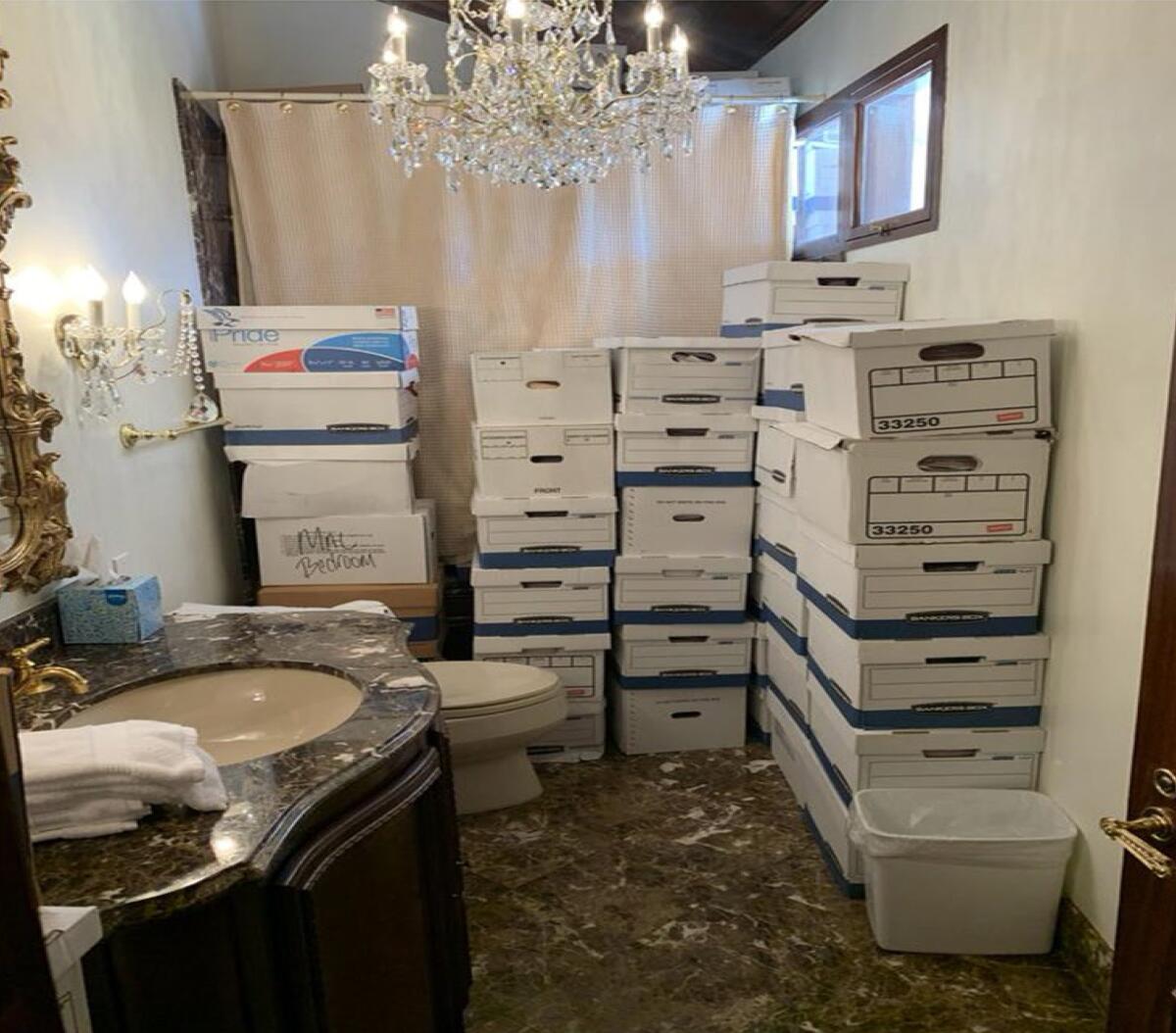
The Justice Department learned of the move and the possibility that classified documents remained at the estate, and gained judicial approval for a search warrant. More than 100 documents with classified markings were found during an FBI search of Mar-a-Lago that August. The indictment states that the recovered classified records came from the CIA, the Defense Department, the National Security Agency and the State Department, among other sources.
Nauta was indicted alongside Trump on charges of conspiracy to obstruct justice, withholding a document or record, corruptly concealing a document in a federal investigation, scheming to conceal and making false statements and representations.
Trump defended Nauta, a Navy veteran who was frequently by his side in the White House, in a Truth Social post before the indictment was made public.
“He has done a fantastic job! They are trying to destroy his life, like the lives of so many others, hoping that he will say bad things about ‘Trump,’” the former president said of Nauta.
The special counsel’s investigation has focused in part on Nauta, who is reportedly seen on surveillance video helping a maintenance worker move boxes from the storage room before the FBI executed the search warrant at Mar-a-Lago.
According to the indictment, Nauta made multiple false statements, including saying he was not aware the boxes had been taken to Trump’s residence for review before 15 of them were sent to the National Archives, and didn’t know how boxes taken to a National Archives truck had come to be in the residence; and that he falsely denied knowing where the boxes had been stored before they were found in Trump’s residence, saying, “I wish I could tell you. I don’t know. I don’t — I honestly just don’t know.”
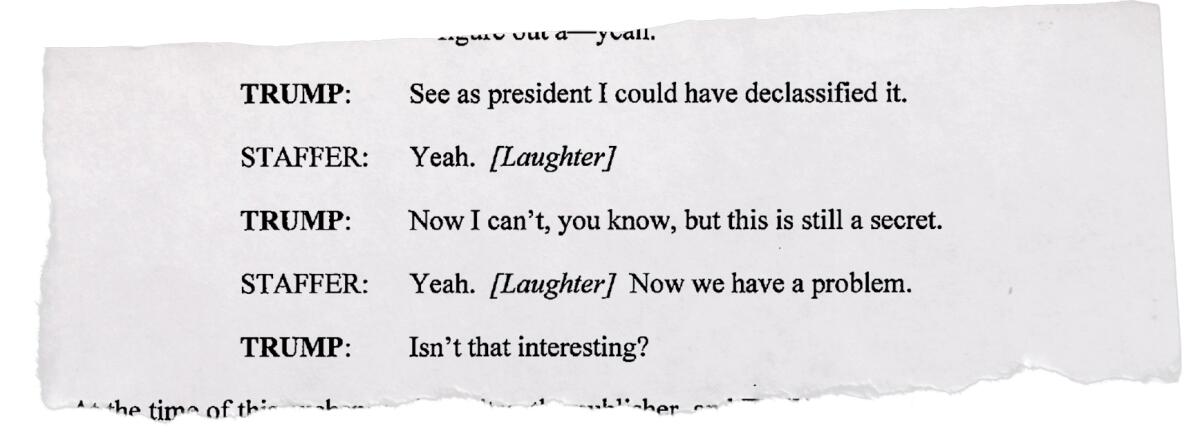
Trump announced in a social media post Thursday that he had been indicted in connection with his handling of the records and had been ordered to appear in federal court in Miami on Tuesday afternoon. The indictment comes nearly a year after more than 100 documents with classified markings were found during the FBI’s search of Mar-a-Lago.
The case appears to have been initially directed toward U.S. District Court Judge Aileen Cannon, a Trump appointee who handled his lawsuit last year over the FBI search. Cannon’s decision to appoint a special master to review materials seized in the search delayed the investigation for several weeks.
Trump has repeatedly denied any wrongdoing, and claimed again late Thursday that he was innocent. On Friday he announced that he was shaking up his legal team, replacing attorneys Jim Trusty and John Rowley with New York-based Todd Blanche and a firm to be named later. Blanche is assisting with Trump’s other indictment on 34 felony charges related to an alleged hush money payment to porn actor Stormy Daniels in the final days of the 2016 campaign.
Trusty and Rowley said in a joint statement that they had resigned, calling it “a logical moment” to leave because the case had moved to Miami.
Trump and his allies quickly framed the new indictment as an attempt to diminish him as a political opponent, with some such as Sen. Josh Hawley (R-Mo.) misrepresenting the legal process.
“If the people in power can jail their political opponents at will, we don’t have a republic,” Hawley, a lawyer and former state attorney general, tweeted.
Such claims disregard that it was a grand jury that recommended the charges based on evidence presented to it, and that it will be a jury that decides Trump’s guilt or innocence on the charges based on the evidence provided in court.
More to Read
Get the L.A. Times Politics newsletter
Deeply reported insights into legislation, politics and policy from Sacramento, Washington and beyond. In your inbox twice per week.
You may occasionally receive promotional content from the Los Angeles Times.



